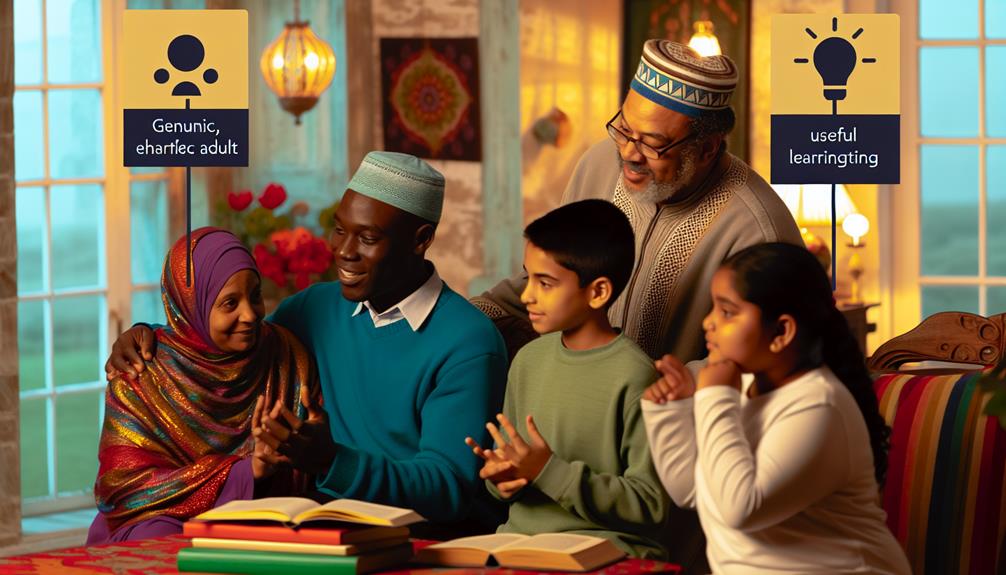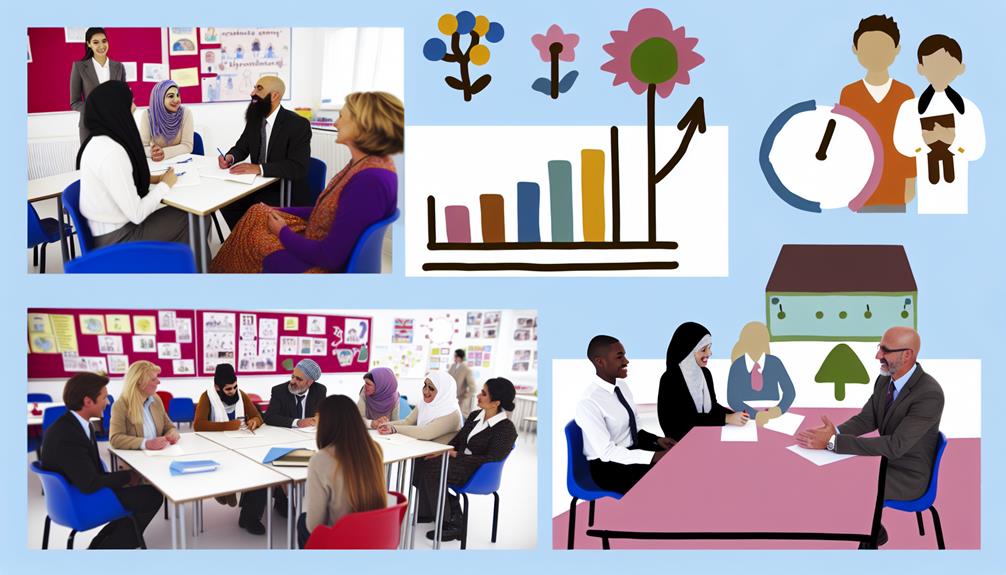In the UK, you'll find an exceptional, thorough foster parent training program that's accessible across the nation. It's designed to equip you with a range of strategies to manage unique challenges in foster care, blending in-class learning with practical role-play. The program not only covers managing behavioural and emotional needs of children but also provides ongoing support for your fostering journey. This support includes invaluable guidance, counselling, and professional development opportunities. As you discover more about this program, you'll learn how these services are vital to shaping resilient children and building brighter futures.
Key Takeaways
- UK's foster parent training services use diverse methods, including classroom learning and practical role-play.
- The training covers managing behavioral issues and emotional needs of the foster child.
- These services are accessible and flexible, available across the country to accommodate a wide range of potential foster parents.
- Continuous professional development is encouraged, with regular workshops, seminars, and online courses available.
- The training services aim to equip foster parents with the necessary skills to tackle unique challenges in fostering.
Understanding UK Foster Care System

To truly grasp the intricacies of the UK's foster care system, it's essential to comprehend its core structure and the roles everyone plays within it. The system is designed to protect, care for, and provide the best possible outcomes for children who can't live with their birth families. It's a complex, multifaceted structure involving numerous agencies and individuals, all working diligently to guarantee the wellbeing of the child.
One key component is the 'Eligibility Criteria' for prospective foster parents. You'd probably think this is a straightforward process, but it's more nuanced than you might expect. It's not just about being over 21 and having a spare room; it's also about your ability to provide a stable, loving environment and meeting the emotional, physical, and developmental needs of the children in your care.
It's also important to understand the 'Adoption Differences'. Foster care isn't always a route to adoption; in fact, most children in foster care return to their birth families. While adoption requires a lifelong commitment and legal changes to a child's status, fostering is often temporary and doesn't alter the child's legal relationship with their birth family.
Comprehensive Foster Parent Training Services
Understanding the nuances of eligibility and adoption differences is just the beginning; you'll also benefit greatly from UK's thorough foster parent training services. These services, known for their all-encompassing approach, are designed to equip you with the skills and knowledge to manage the unique challenges that come with fostering.
Training methodologies used in these services are diverse and innovative, combining traditional classroom learning with practical role-play, online modules, and peer group discussions. These methodologies guarantee a holistic understanding of the child's needs and foster family dynamics. You'll learn about everything from managing behavioural issues to understanding the emotional needs of children coming from traumatic backgrounds.
Service accessibility is another strong point of UK's foster care system. The training services are readily available across the country, ensuring that no potential foster parent is left without the necessary support. They're flexible too, with options to suit your schedule, whether you're juggling a full-time job or other commitments.
Role and Importance of Support Services

Just as essential as training, ongoing support services play a crucial role in your fostering journey, providing invaluable guidance and assistance whenever you need it. These services are your lifeline, bolstering your confidence and equipping you to handle the challenges foster parenting can bring.
The UK's foster care system recognises the importance of a robust support system, and it's an integral part of their services. One valuable component is the Support System Evaluation. It's a tool designed to regularly assess and fine-tune the support you receive, ensuring it remains relevant to your unique situation.
Equally important is counselling. The role it plays can't be overstated. It helps you navigate the emotional complexities that come with foster parenting and serves as a platform where you can express your feelings without judgement. The importance of counselling lies in its ability to offer timely advice and emotional support, contributing significantly towards your resilience and well-being.
In a nutshell, support services are indispensable. They provide the guidance you need to make your fostering journey a success. Remember, it's not just about the training you receive, but also about the support you're given along the way.
Case Studies: Success in Foster Parenting
With the right guidance and support, many foster parents in the UK have successfully navigated their unique journeys, as illustrated in the following case studies.
Consider the Johnson family, who fostered resilience in a young child dealing with trauma. Having undergone intensive training, they provided a loving and secure environment, allowing their foster child to heal and grow. This child, once withdrawn and anxious, is now a confident and happy individual, all thanks to their nurturing and understanding foster parents.
Next, let's look at the Smiths, who've numerous adoption successes to their name. They've extended their family by adopting three siblings, keeping the children together and providing a stable home. Their journey wasn't without challenges, but they tackled these with the skills learned in their training, reinforcing the importance of such services.
These stories underline the transformative power of effective foster parenting. They highlight the difference that you, too, can make with the right training and support. Remember, each child is unique, each journey distinct. But with commitment and a willingness to learn, you can turn challenges into successes, positively impacting a child's life in the process.
Exploring Continuous Professional Development

Entering into the domain of continuous professional development, it's crucial to recognize that your journey as a foster parent doesn't end at initial training; it's an ongoing process that's just as important for your growth and the well-being of the children you nurture.
Professional growth strategies in the UK foster care system are designed with the understanding that your learning and development need to be continuous. This continuous training helps you to stay abreast of changes in foster care legislation, develop new skills, and refresh existing ones.
Recognizing the challenges you face, UK's foster care sector is committed to providing extensive support systems. They offer workshops, seminars, and online courses to help you build on your existing knowledge. It's an opportunity to share experiences, learn from others, and gain a deeper understanding of child development, attachment issues, and trauma recovery techniques.
It's not just about fulfilling statutory requirements; it's about ensuring the success of the fostering journey for both you and the child in your care. So, keep pushing your boundaries, keep learning, and keep growing. After all, your continuous professional development is essential in shaping lives and building futures.
Frequently Asked Questions
What Is the Procedure to Become a Foster Parent in the Uk?
You'll start with an application process, meeting foster criteria set by UK authorities. This involves background checks, interviews, and training sessions. It's a rigorous journey, but worthwhile to provide a safe home for a child in need.
What Is the Minimum Age Requirement to Become a Foster Parent?
You've to be at least 21 to become a foster parent in the UK. However, age exceptions can be made, considering cultural impacts and personal circumstances. It's more about your ability to care than age.
Are There Any Financial Benefits Provided to Foster Parents?
Yes, as a foster parent, you're provided with tax allowances and other supportive resources. This financial support is designed to help you cover the cost of caring for your foster child effectively.
How Is the Transition Process Managed When a Child Is Placed or Moved From a Foster Home?
Isn't changing tough? UK's foster services manage this by employing emotional support strategies. You're guided through post-placement adjustments, ensuring your foster child's shift is as smooth as possible. Isn't that what we all want?
Can Single Individuals Also Apply to Become Foster Parents?
Of course, you can apply to become a foster parent even if you're single. However, be prepared for single parenting challenges and make sure you are emotionally ready to provide a nurturing environment for the child.
Conclusion
You've now glimpsed the unparalleled world of UK's foster parent training services. Astoundingly thorough, tirelessly supportive, and ceaselessly focused on development, these services genuinely are the backbone of success stories across the country.
They're not just simply services, but a lifeline, a guiding star, a catalyst for transformative change. Remember, becoming a foster parent isn't just a noble act, it's a journey – a journey made smoother and brighter with UK's exceptional foster parent training services.




